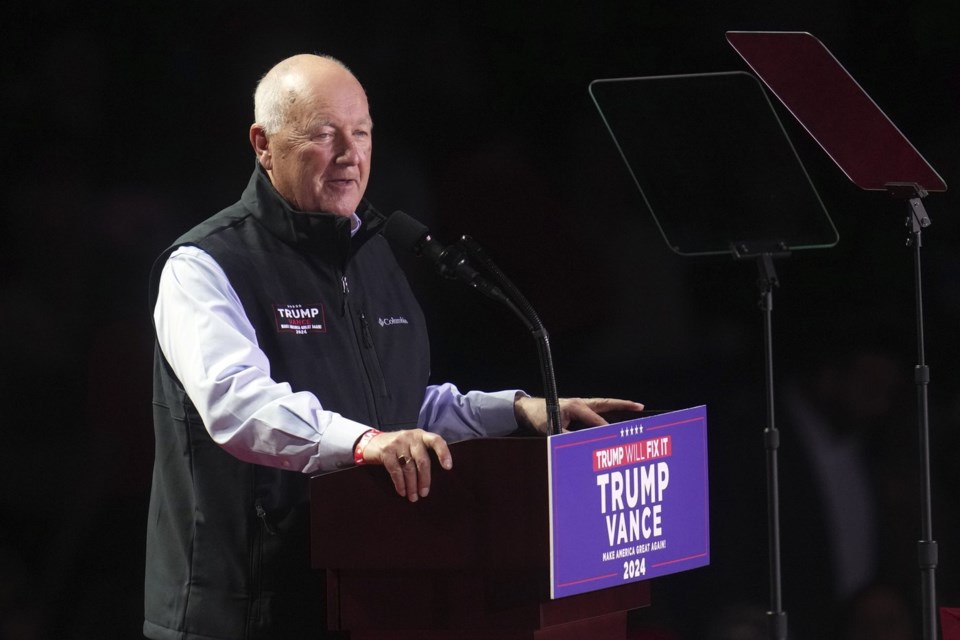OTTAWA — Ottawa should block Donald Trump's chosen ambassador to Canada until the U.S. president stops questioning Canada's sovereignty, says one expert.
"We could potentially use (this) as a way of signalling the seriousness with which the Government of Canada is viewing this unwelcome talk," said University of Victoria international relations professor Will Greaves.
"It is an overt, aggressive policy that (Trump) seems to be shifting his administration to endorse. And if we are remotely serious as a country, we should regard that as a hostile action and embrace a wider array of tools in our response towards it."
Trump has said repeatedly for weeks he wants to make Canada a U.S. state and has threatened to do so through economic coercion, prompting his officials to make similar comments.
Prime Minister Justin Trudeau initially characterized those comments as jokes. But he told business leaders last Friday that the idea of absorbing Canada "is a real thing" for Trump, because of Canada's resource wealth.
Trump said Sunday that he could easily enact economic policies that "would not allow Canada to be a viable country," such as shutting down Canada's auto sector.
"Without the U.S., Canada doesn't really have a country. They do almost all of their business with us," Trump said.
The diplomatic protocols governing how countries appoint a head of mission involve making a formal request for the receiving country to accept the appointment prior to the ambassador's arrival. Arriving ambassadors later present their formal credentials to the governor general.
Trump announced last November that he had tapped former Michigan congressman Pete Hoekstra to serve as the next American envoy to Canada.
While Hoekstra still needs to be confirmed by the U.S. Senate, Foreign Affairs Minister Mélanie Joly has welcomed him as someone who understands the importance of cross-border trade.
Greaves said the U.S. ambassador to Canada is a "patronage appointment" used by presidents to reward a key supporter with a plum post that involves overseeing an embassy whose staff do the heavy lifting of diplomatic relations.
"To reject, or not accept, the credentials of the next U.S. ambassador would be to deprive Donald Trump of that plum patronage appointment that he can give to one of his supporters," Greaves said. "That costs him something."
While Canada's ambassadors in Washington sometimes have political ties, they're generally appointed due to their diplomatic skills and have a major role in managing the country's most important bilateral relationship.
Greaves said he came up with the idea once it became clear that Trump wasn't going to stop talking about annexing Canada.
He said diplomacy exists to provide countries with "a way of increasing the costs" of hostile acts, without resorting to economic or military responses.
Greaves argued Canada would block the appointment of an ambassador of any other country exhibiting the same behaviour — if, for example, Russia sent an ambassador after suggesting the Canadian Arctic was actually Russian territory.
"We shouldn't allow the fact that it's the United States to overly colour what is an appropriate reaction under these circumstances," he said.
Greaves said that if Trump doesn't change his tune, Canada should seriously consider barring him from the G7 leaders' summit, planned for mid-June in Alberta.
"Why would Canada host, as an honoured guest on its soil, the head of state of the country that is publicly, repeatedly and directly challenging our very sovereignty over the place that he would be coming to visit?" he said.
Greaves said the U.S. likely would retaliate if Canada sought to block its ambassador, but he described that as part of the "price" Canada will have to pay to fight for its sovereignty.
"That is the price of our independence, as decided by Donald Trump," he said.
Refusal to accredit an envoy is a response reserved for serious international disputes. In Canada, it's even more rare than expulsions of foreign diplomats.
In 2023, Joly told Parliament that Ottawa had declined to issue a diplomatic visa for "a political operative" from China because they were deeply linked to the Communist Party of China.
In 2018, Ottawa barred three of Russia's proposed diplomats from serving in Canada, and expelled four who were already accredited to Canada, in response to the poisoning of former Russian spy Sergei Skripal in the U.K.
In 1987, Ottawa refused to accredit Israel's chosen military attaché Amos Yaron following reports of concerns about militia attacks on Palestinian civilians in Beirut during the 1982 Lebanon War.
There have been unconfirmed reports in recent weeks that the Trump administration could block the U.K.'s chosen ambassador to Washington, Peter Mandelson, who recently walked back previous comments that Trump was "reckless" and "a bully."
This report by The Canadian Press was first published Feb. 11, 2025.
Dylan Robertson, The Canadian Press



